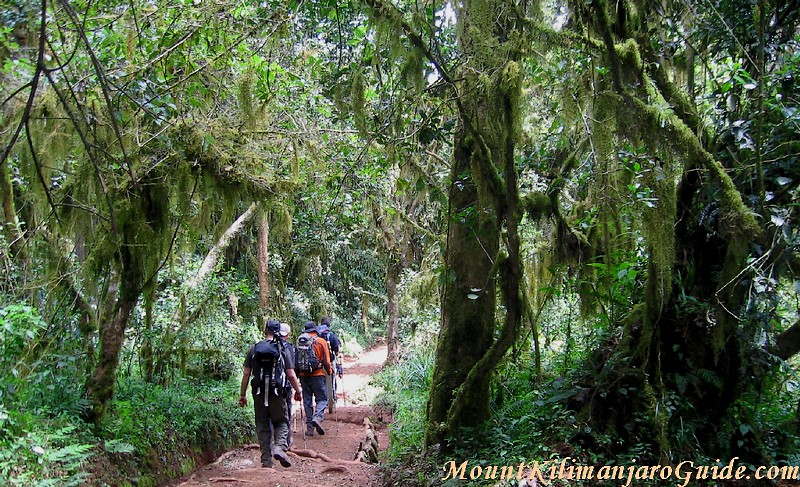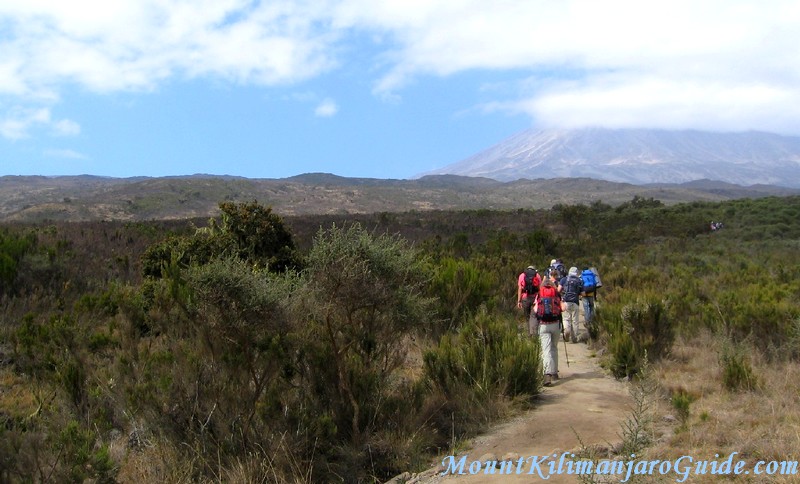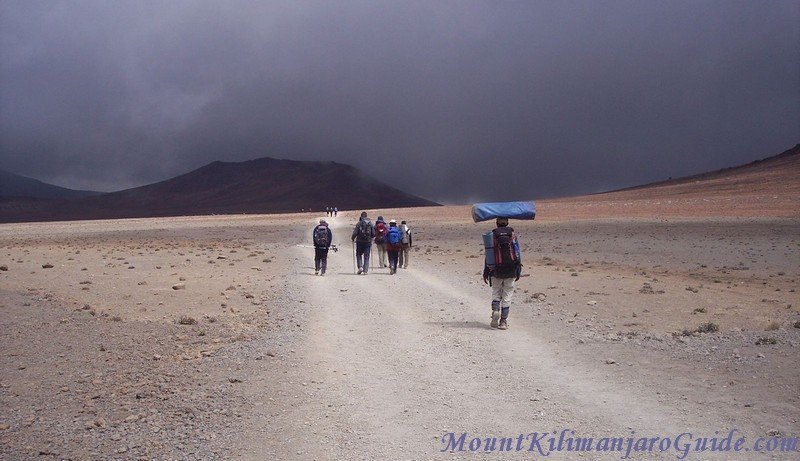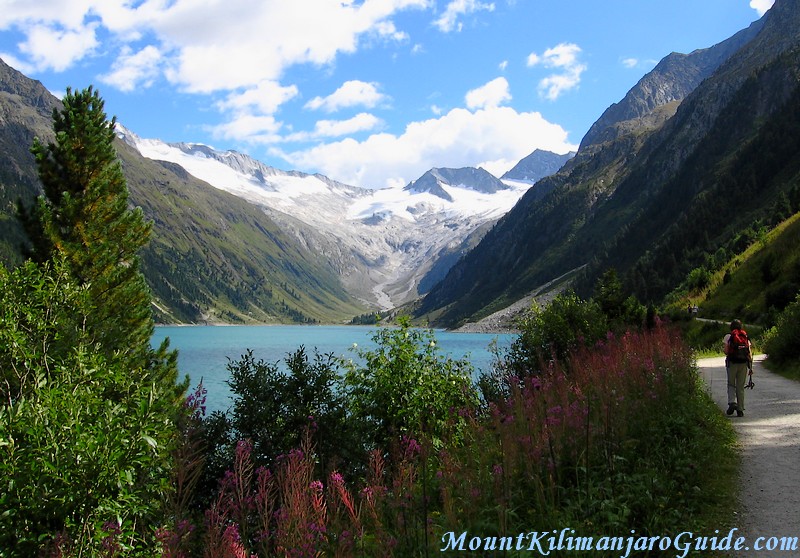Climbing Mt. Kilimanjaro: Training for a Kili Climb
Do you need training for a Kilimajaro climb?
And if yes, when should that Kilimanjaro training start? What should you do? And how much of it?
Climbing Mount Kilimanjaro is not considered difficult.
It is a hiking peak. You need no ropes, no special climbing equipment, no previous climbing experience.
You also don't need more than average fitness.
But that doesn't mean it's a walk in the park!
You need to be prepared and that includes physical preparation, which we will talk about on this page.
How to train for Kilimanjaro
If you dislike gyms, jogging, huffing and puffing, if you dread the idea of following a strict Kilimanjaro training program to get yourself into shape, then I have good news for you:
You don't need any of that!
Mind you, if you like it it's not going to hurt.
But you can't train for a Kilimanjaro climb in the gym or on an exercise machine.
And no matter how many years you've been running marathons, you are no better prepared for this adventure than any other person of average fitness.
(In fact, there are many stories where exactly those super fit people were the very first in a group to succumb to altitude sickness, but that's a different issue. Read about altitude sickness on Kilimanjaro here.)
So, you don't need to be super fit to climb Kilimanjaro. You do need to be fit enough to walk, because that's what you will be doing. A Kilimanjaro climb is a very slow walk, all the way...
 Walking on Kilimanjaro on day 1.
Walking on Kilimanjaro on day 1. Walking on Kilimanjaro on day 2.
Walking on Kilimanjaro on day 2. Depending on the route you choose this is your path on day 3 or 4, the last day before summit day..
Depending on the route you choose this is your path on day 3 or 4, the last day before summit day..
But that does not mean you need no Kilimanjaro training at all!
The Best Kilimanjaro Training
While by far the best overall preparation for a Kili climb is previous mountain climbing or trekking experience (see: Do you need experience to climb Kilimanjaro?), the best Kilimanjaro training is to simply walk.
Pretty much everyone is able to walk slowly. But few people are used to walking for many hours, several days in a row.
Do you know what it's like to start a new job where all of a sudden you have to stand all day? Say, behind a counter? It's not something that you need to be fit for. But it is something your body has to get used to. The first days will be awful and you will be dead tired when you get home, and your legs will swell up and hurt.
It's similar with training for a Kilimanjaro climb. You don't need to be exceptionally fit, but you do need to get your body used to the particular demands of this hike. Otherwise the first days will be so tiring that you will have no energy left when it counts.
Again, the best Kilimanjaro training is to simply walk.
Walk as often as you can and as much as you can. Wear the boots you will be wearing on the climb. (If they are newish then this is very important!) Wear the day pack that you intend to take.
If you've never done much hiking, start a few months before your departure date and start slowly.
My mother did only four weeks of this, increasing the volume every week:
We did two days of walking in the first week, each time covering 700 m - 800 m (2300 ft - 2600 ft) in altitude difference.
In the second week we increased that to 1000 m - 1100m (3300 ft - 3600 ft), and in the third to about 1300 m (4250 ft).
(This is a lot more than you have to do on Kilimanjaro, because during those training hikes we also had to come down again. And drive home, prepare our own meals etc. You have to do none of that on Kili.)
During the last week we did two overnight hikes, spending the nights in mountain huts.
My mother hadn't done anything resembling exercise for a couple of decades. She spent most of her days sitting.
However, she DID have mountaineering and trekking experience in her younger years.
She already knew HOW to walk. At a slow and very steady pace.
And that's why two "training" trips a week for four weeks were enough for her.
If you have never done anything like this before then you will need more time to adapt and you will want to start with much shorter hikes.
Definitely also read this page, which talks more about the demands of this particular climb and what to pay attention to on your outings.
You don't have to walk fast. You need to learn to walk at a steady pace that never feels strenuous.
If you are exhausted after a couple of hours then you were walking too fast.
Walk as slowly as you need to to be able to walk for many hours.
Trust me, you will be walking even more slowly on Kilimanjaro. Your guides will make sure of that.
So: walk as much as possible, slowly increasing the duration and altitude difference covered on your outings.
Look for nature trails, uneven ground, head for hills and mountains if there are any within your reach.
If you can afford to, travel to spend a few days in the mountains.
Only if this is something that you would enjoy, of course. Go to places that you would like to see anyway.
Make your training enjoyable and you will be doing more of it.
 Kilimanjaro training in the Austrian Alps.
Kilimanjaro training in the Austrian Alps.
Use the weekends to do full day hikes and if possible overnight hikes.
At the end of your "Kilimanjaro training" you should be able to walk (very slowly!) in hilly country for 6-8 hours (including breaks), and then get up and do it again the next day.
If you can do that, and then return to the office on Monday feeling fine, then you are more than fit enough to climb Kilimanjaro.
Your days on Kilimanjaro will be shorter but you will be affected by the altitude, so building up a bit of extra stamina sure won't hurt.
Unfortunately sufficient fitness is no guarantee that you will reach the top, because ...
Next: Altitude Sickness on Kilimanjaro
Overview: What it takes to climb Kilimanjaro
Do you need help with all this?
Would you like to contact a responsible and trustworthy tour operator with competitive prices?
Get some free, no obligations advice on route selection, duration and timing?
I regularly receive emails asking me if there is a tour operator I personally can recommend.
There is and you can contact my preferred operator through this page.